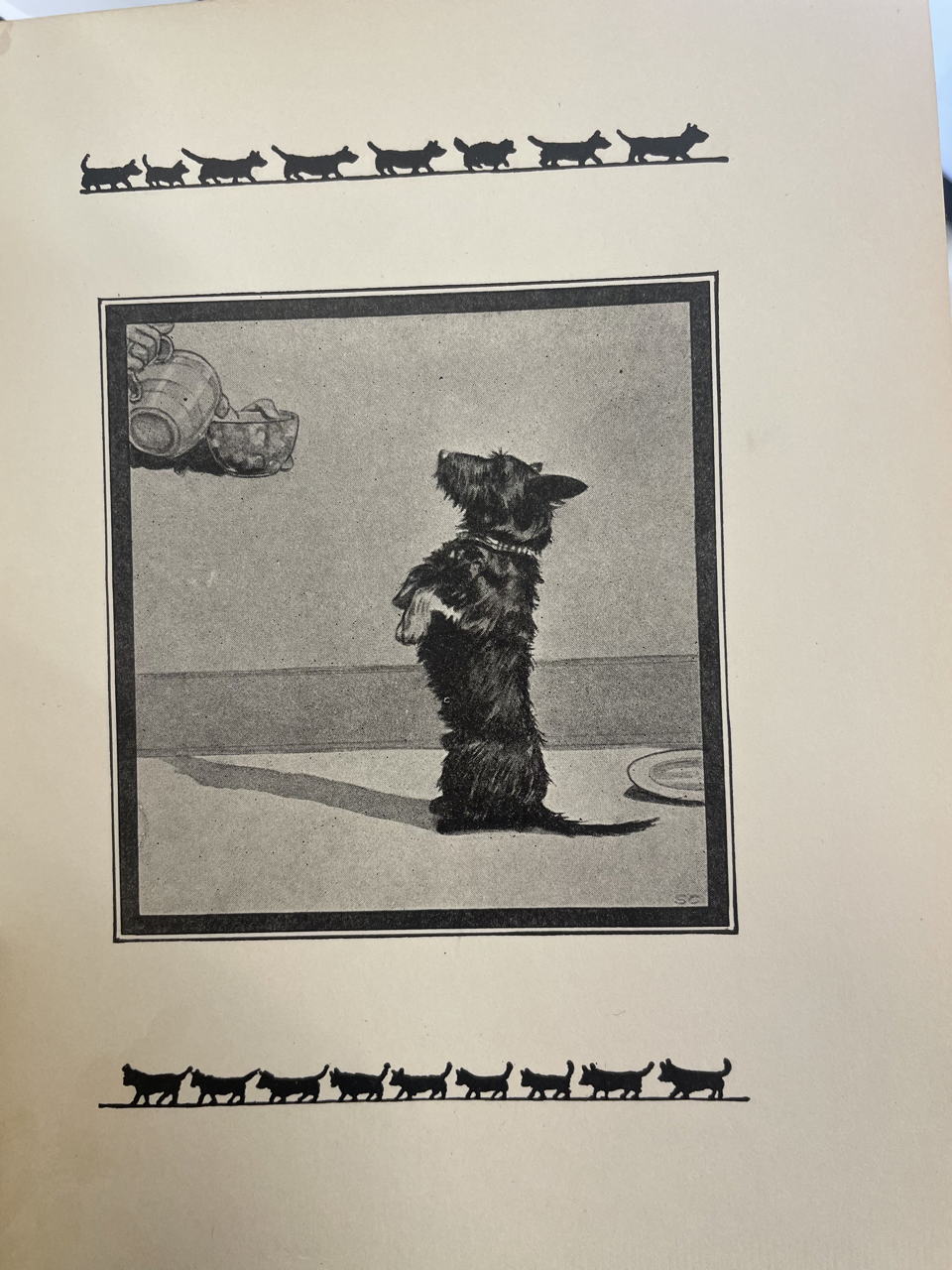The Rubáiyát of a Scotch Terrier by Sewell Collins is a parody of the famous and well-established Rubáiyát of Omar Khayyam translated by Edward FitzGerald. Sewell Collins is an American dramatist and film producer born in Denver, Colorado, in 1876. It was published in 1926 by Frederick A. Stokes Company and has 71 unmarked pages. The exact edition of FitzGerald’s Rubáiyát of Omar Khayyam that this edition is based on is unknown because it is a parody. Thus, any distinction between the three editions of the poem can’t be distinguished. It is important to note that although this is a parody, the structure of the rubáiyát remains. There are 10 syllables in each line, and Sewell Collins obeys the aaba rhyme scheme. This copy is hardback without a dust jacket, like other copies of this book. The cover is a vibrant yellow mustard with a photograph of a Scottish terrier towards the bottom.
This photograph also appears in the frontispiece and is a defining feature of the book because it is the only photograph in the entire book. Every other picture in the book is a black-and-white illustration of a Scottish terrier drawn by Sewell Collins. This photograph is also unique because it can presumably be a picture of Sewell Collins' Scottish terrier “Socks,” to whom the book is dedicated. The photograph of the Scottish terrier on the cover and frontispiece has white markings on its chest and two front paws, resembling socks. These distinct markings are why it can be assumed that the picture on the cover is the same “Socks” that the novel is referring to in its dedication.
The edition also has an epigraph that quotes a part of the “Eulogy of the Dog" speech by Senator George Vast. Before Senator George Vast was a senator, he was a lawyer in a case where a man’s dog had been shot by his neighbor. The man whose dog had been killed demanded damages because the dog was a hunting dog, and Vast defended this argument by talking about the loyalty of a dog and how they are man’s best friend. Some of the sentences that Sewell selected include “A man’s dog stands by him in prosperity and in poverty, in health and in sickness,” and “When the last scene of all comes and death takes his master in its embrace and his body is laid away in the cold ground, no matter if all other friends pursue their way, there by his grave will the noble dog be found.” A row of Scottish terriers borders the epigraph alongside all stanzas and illustrations in the edition.
Sewell Collins draws these illustrations. His initials are at the bottom right corner of each drawing. The drawings show the same Scottish terrier doing several stereotypical ‘dog’ activities throughout the day. The drawing of the Scottish terrier has the same markings as the dog in the photograph. The drawings are not Persian in style, which is common with gift books of the Rubáiyát. One drawing shows the terrier on its hind legs begging its owners for food. Another illustration shows the dog in the garden chewing on a bone. Almost every stanza is accompanied by a drawing that encapsulates the stanza's message. For example, the drawing of the Scottish terrier in the garden chewing on a bone corresponds to the stanza where the terrier discusses how the kitchen is closed, so he’s unable to get scraps from there, so he must rely on his bones, still buried beneath the vines in the garden.
Sources Cited
Byrd, Robert C. “Classic Senate Speeches.” U.S. Senate: Classic Senate Speeches, 8 Aug. 2023, www.senate.gov/artandhistory/history/common/generic/Speeches_Vest_Dog.htm. Accessed 23 Apr. 2025.


